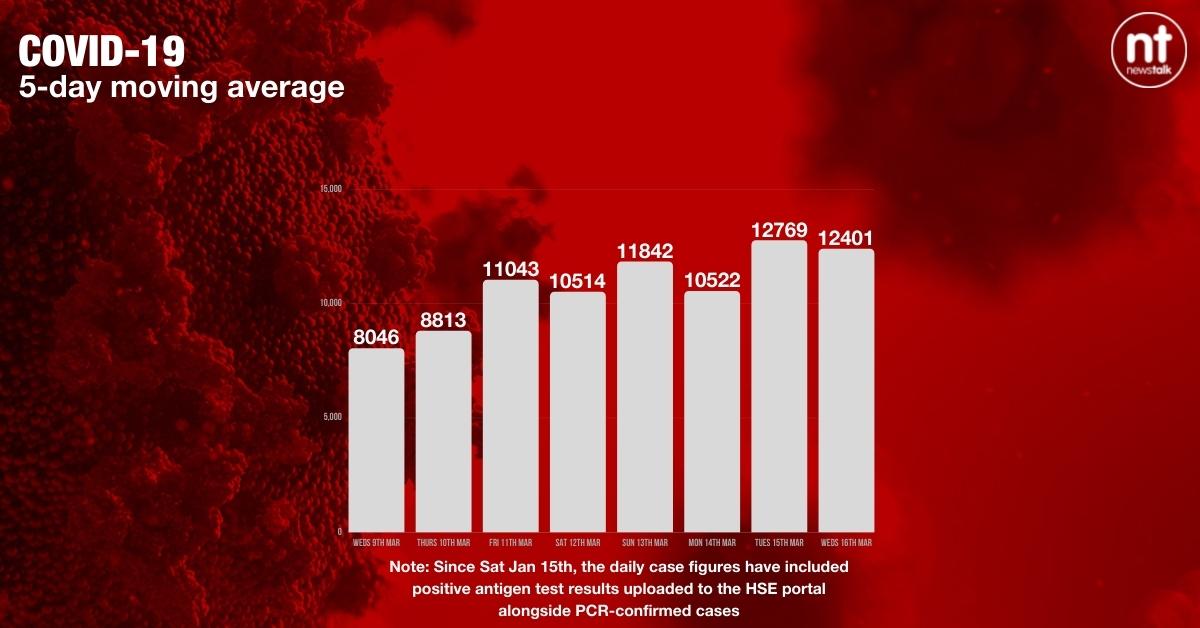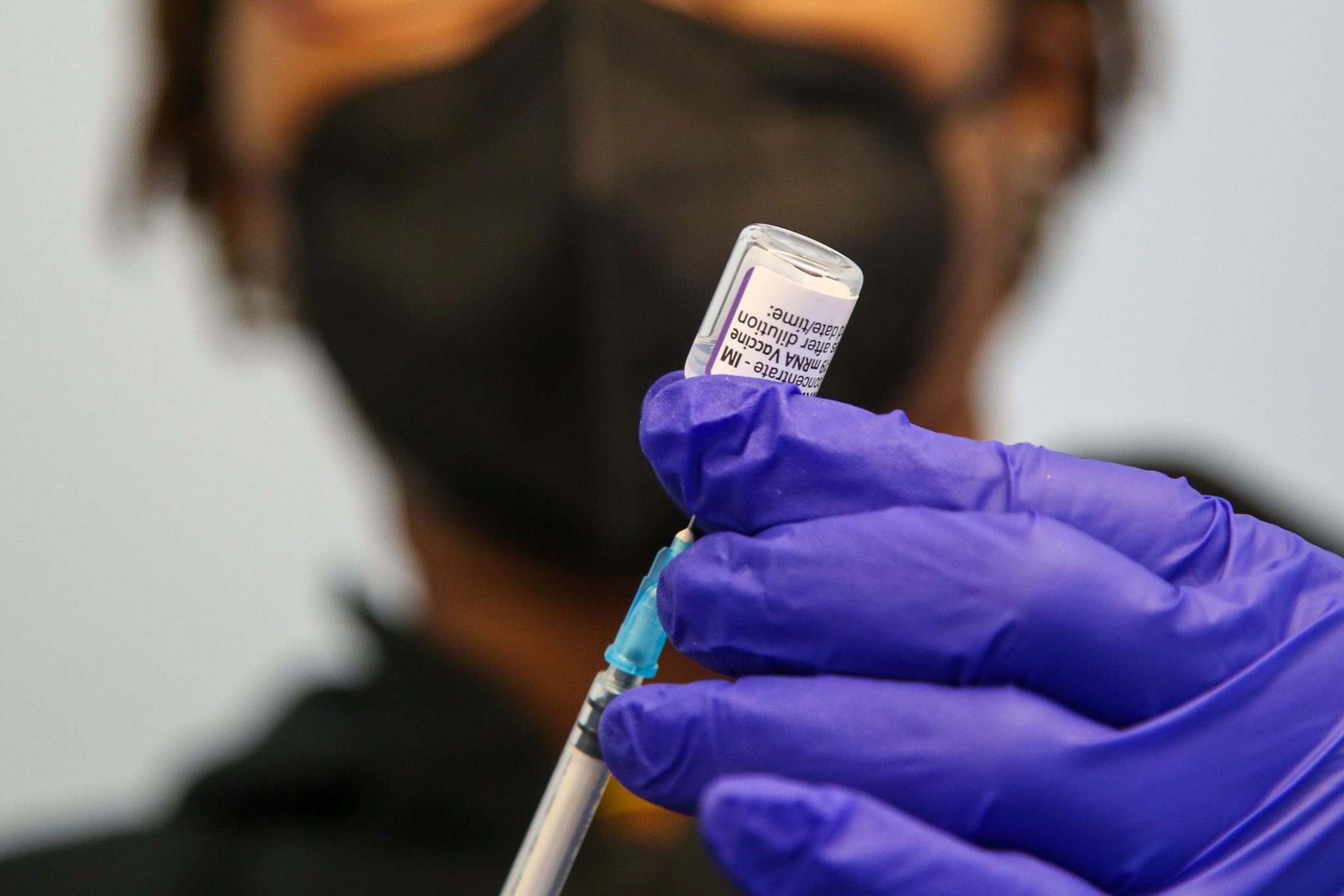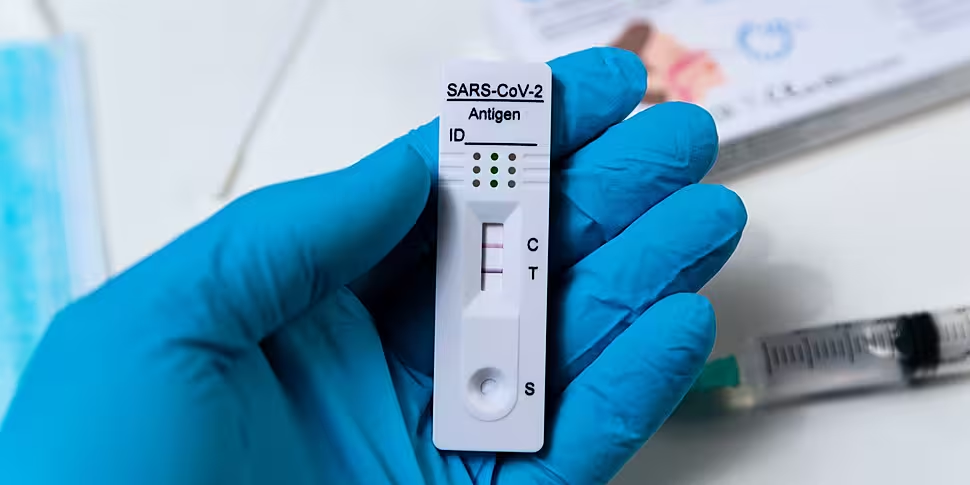A further of 5,452 PCR-confirmed COVID cases have been announced this evening.
Meanwhile, 8,644 people registered a positive antigen test through the HSE portal yesterday.
This morning, there were 1,081 patients with COVID in hospital – up 252 on this day last week.
There were 44 in intensive care, which is seven fewer than last week.
 The five-day moving average. Image: Newstalk
The five-day moving average. Image: NewstalkSince PCR testing was restricted for the under-40s in mid-January, the positive antigen test results uploaded to the HSE portal have been reported alongside PCR-confirmed results.
When both are included, the five-day moving average is now 12,401.
Taoiseach Micheál Martin met with Irish businesses in the US this morning. Opens a press conference saying Kerrygold is the number 2 butter in the USA pic.twitter.com/bshS4jlDhT
— Seán Defoe (@SeanDefoe) March 16, 2022
Speaking in the US this evening, the Taoiseach said there have been no discussions in government about bringing back COVID restrictions.
He said he is concerned about the rise in cases; however, he noted that there has been no rise in ICU [patients and 50% of the patients in hospital are there for other ailments.
He appealed to people to enjoy the long St Patrick's Day weekend but to take basic precautions like mask wearing.
Cabinet members have spoken to the Chief Medical Officer about the situation, but Micheál Martin says no new restrictions are being considered.
“I think the key message I would give is vaccination,” he said.
“A lot of people out there have not got the booster. We would urge people to get that booster and to get vaccinated – particularly those who got sick earlier in the year with COVID and didn’t get the opportunity to get their booster.
“So, we think vaccination is the key.”
 2HA1ETD London, UK. 9th Dec, 2021. A NHS vaccinator prepares to administers the Pfizer/BioNTech Covid-19 booster jab to a woman, at a vaccination centre. (Credit Image: © Dinendra Haria/SOPA Images via ZUMA Press Wire)
2HA1ETD London, UK. 9th Dec, 2021. A NHS vaccinator prepares to administers the Pfizer/BioNTech Covid-19 booster jab to a woman, at a vaccination centre. (Credit Image: © Dinendra Haria/SOPA Images via ZUMA Press Wire)Also speaking in the US, Professor Philip Nolan said the current numbers are not worrying – noting that the number of people in ICU continues to decline.
He said the numbers we are now seeing could be defined as an “exit wave of the pandemic”.
“We are seeing higher numbers of infection but what we are also seeing is the impact of vaccination,” he said.
“Even though we are seeing large numbers of infections and the virus transmitting, that is sort of an exit wave of the pandemic if you want to put it that way.
“It is not translating into serious harm. It is not translating into intensive care or ventilations in anything like the way it did in previous waves.
“So, to a certain extent this is expected and the important thing to watch here is the level of serious illness and harm and there is nothing in the data at the moment to suggest anything other than the situation is improving.
“The number of people on ventilation and the number of people in ICU has actually declined all the way since last November at the end of the Delta wave.”
Prof Philip Nolan in Washington DC says he isn’t worried about the rise in the number of new Covid cases. Describes it as an “exit wave” from the pandemic pic.twitter.com/Qt7BPeHyp1
— Seán Defoe (@SeanDefoe) March 16, 2022
The Department of Health is warning people that it is important to continue to follow the public health advice in order to socialise safely and protect the vulnerable over the St Patrick’s Day weekend.
It said the increase in patients with COVID is placing an additional burden on the delivery of services across hospitals and Emergency Departments.
“Anyone who has symptoms of COVID-19 should self-isolate until 48 hours after symptoms have substantially or fully resolved,” it said.
“Please do not attend any social events, work, school or college if you have symptoms.
“Mask wearing is advised in crowded indoor settings, on public transport and in healthcare settings. Anyone who wishes to wear a mask should not be discouraged from doing so.
“Continue to practise good hand and respiratory hygiene by washing and sanitising hands regularly and coughing/sneezing into your elbow. Maintain a physical distance where possible.
“Meet up outdoors if possible. When meeting indoors, avoid poorly ventilated spaces and keep windows open.”
It noted that anyone diagnosed with COVID should isolate for seven days form when they first experienced symptoms.
Those who are asymptomatic should isolate for seven days after their first positive test.
The department said many people who tested positive over Christmas are now eligible for their booster.
You can book a booster appointment on www.hse.ie









